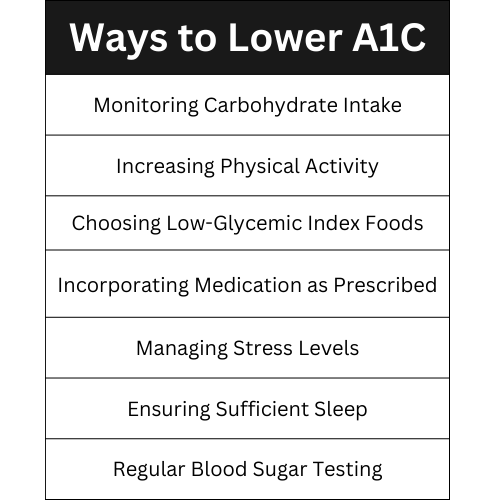Introduction

A1C, or hemoglobin A1C, is a crucial measure of average blood sugar levels over the past two to three months. It provides valuable insights into how well blood sugar levels are being managed over time, making it a key indicator for individuals with diabetes.
Living with diabetes requires proactive management of blood sugar levels, particularly A1C, which reflects average blood sugar over several months. Lowering A1C is crucial for minimizing complications and maintaining quality of life. Let’s delve into key strategies for achieving optimal A1C levels.
Ways to Lower A1C
Monitoring Carbohydrate Intake
Controlling carbohydrate consumption is fundamental to managing blood sugar levels. Focus on complex carbs with a low glycemic index (GI) to prevent sharp spikes in glucose levels.
Increasing Physical Activity
Regular exercise aids in improving insulin sensitivity and lowering A1C levels. Aim for a combination of aerobic and strength-training exercises for maximum benefit.
Choosing Low-Glycemic Index Foods
Opt for foods with a low GI to stabilize blood sugar levels. This includes whole grains, non-starchy vegetables, and lean proteins.
Managing Stress Levels
Chronic stress can elevate blood sugar levels. Incorporate stress-reducing activities like meditation, yoga, or hobbies to maintain emotional well-being.
Ensuring Sufficient Sleep
Quality sleep is crucial for blood sugar regulation. Aim for 7-9 hours of uninterrupted sleep per night to support overall health.
Incorporating Medication as Prescribed
Follow your healthcare provider’s recommendations for diabetes medications or insulin therapy. Adhering to prescribed treatments is vital for effective blood sugar control.
Regular Blood Sugar Testing
Frequent monitoring of blood sugar levels provides valuable insights into the effectiveness of lifestyle changes and medication adjustments.
FAQs about Ways to Lower A1C
Q.How does exercise help in lowering A1C?
Regular exercise increases insulin sensitivity, allowing cells to utilize glucose more effectively, thus lowering A1C levels over time.
Q.What role does diet play in controlling A1C levels?
A balanced diet consisting of low-glycemic index foods helps prevent blood sugar spikes and contributes to stable A1C levels.
Q.Can supplements assist in lowering A1C?
Certain supplements like chromium, alpha-lipoic acid, and cinnamon may complement diabetes management but should be used under medical supervision.
Q.How often should A1C levels be tested?
A1C levels should be monitored regularly as per your healthcare provider’s recommendation, typically every 3-6 months.
Q.What lifestyle changes can help lower A1C?
Apart from diet and exercise, maintaining a healthy weight, managing stress, and getting adequate sleep are beneficial in lowering A1C.
Q.Is it possible to lower A1C without medication?
For some individuals, lifestyle modifications alone can effectively lower A1C levels. However, consult a healthcare professional for personalized guidance.
Conclusion
Effective management of A1C is essential for individuals with diabetes to minimize complications and lead a healthy life. By implementing these proven strategies, you can take charge of your blood sugar levels and improve overall well-being.

